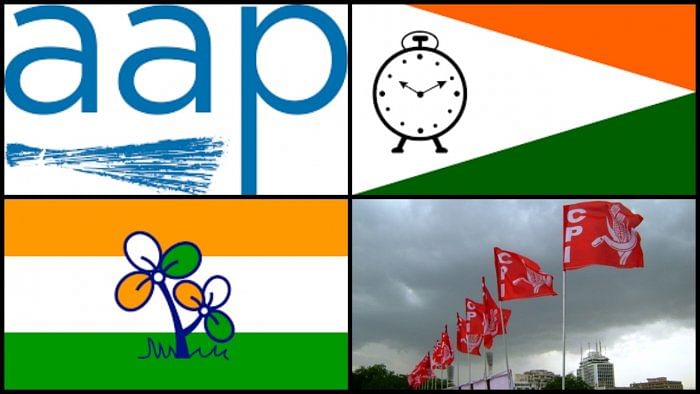
With granting recognition to the Aam Aadmi Party (AAP) as a national party and revoking the same status for the Communist Party of India (CPI), the Nationalist Congress Party (NCP), and the All India Trinamool Congress (AITC), the Election Commission of India (ECI) might have altered India’s political landscape, ahead of the crucial state elections in 2023 and the general elections in 2024.
The ECI has maintained that the recognition as a national or state party is earned on the sole criteria of electoral performance, and it is not possible for it to either deviate from this or apply new considerations. The parties that currently enjoy the national party status are AAP, the Bahujan Samaj Party (BSP), the Bharatiya Janata Party (BJP), the Communist Party of India (Marxist), the Indian National Congress, and the National People's Party (NPP), and further change in their status may take place based on their performance in 2024.
AAP, riding on its victory in Punjab and Gujarat, is elated and is viewing this elevation as a shot in the arm for its national ambitions. Now, with the elections in Karnataka, Madhya Pradesh, and Rajasthan around the corner, it will soon start flaunting its national status. Armed with additional privileges for campaigning and moving to the top of the electronic voting machine (EVM), AAP has become the most active national party after the BJP and the Congress.
Going by the yardstick of electoral performance, AAP’s rise is likely to affect the prospects of the Congress more than the BJP’s in future elections. As the Congress remains the main challenger to the BJP at the national level, AAP is likely to focus on Karnataka to strengthen itself as a national party. With its new status, it may also affect the performance of Congress in Karnataka and other states as well.
The loss of national party status of the CPI, the NCP, and the AITC is further going to dent their prospects in the upcoming assembly elections, none of which are in their strongholds. With this, they are certain to lose the perception of being the contenders to lead the opposition parties against the BJP in 2024. Their priorities would be to gain back the national party status by performing well in the upcoming elections.
Of the three parties, while the CPI enjoyed the status of a national party since 1989, the NCP was recognised as a national party in 2000, and the AITC in 2016. Losing its state party status in West Bengal and Odisha, the CPI will have to be content with being treated as a state party in Kerala, Manipur, and Tamil Nadu. The NCP has lost its state party status in Goa, Manipur, and Meghalaya, and is now restricted to its home states of Maharashtra and Nagaland.
Also Read | Real impact of an ornamental ‘national’ status
The AITC, having lost its national status due to its poor show in Goa and some northeast states, is now exploring legal remedies against the ECI order. The party is aggrieved since its leader and West Bengal Chief Minister Mamata Banerjee had been working to create a united opposition against the BJP, excluding the Congress.
In such a scenario, the Congress stands to bear the indirect effects of the changes. It has a clear alternative ideology on most important issues that the BJP is pursuing. Rahul Gandhi’s disqualification as a Member of the Lok Sabha on March 23, shortly after his Bharat Jodo Yatra and campaign against the alleged links between Prime Minister Narendra Modi and industrialist Gautam Adani, has yet again put the Congress at the centre stage of the national politics.
However, going by the prevailing political situation, AAP’s emergence as a national party and loss of national party status by the CPI, the NCP, and the AITC is likely to put the BJP on a better footing than the Congress. Therefore, it is difficult at this point to assess who would benefit in the 2024 general elections from the change in the status of different parties. Much would also depend on the electoral performance of other regional parties whose status has not been affected by the recent ECI orders.
(Prafulla Das is a Bhubaneswar-based journalist.)
Disclaimer: The views mentioned above are the author's own. They do not necessarily reflect the views of DH.